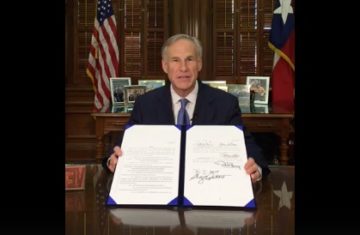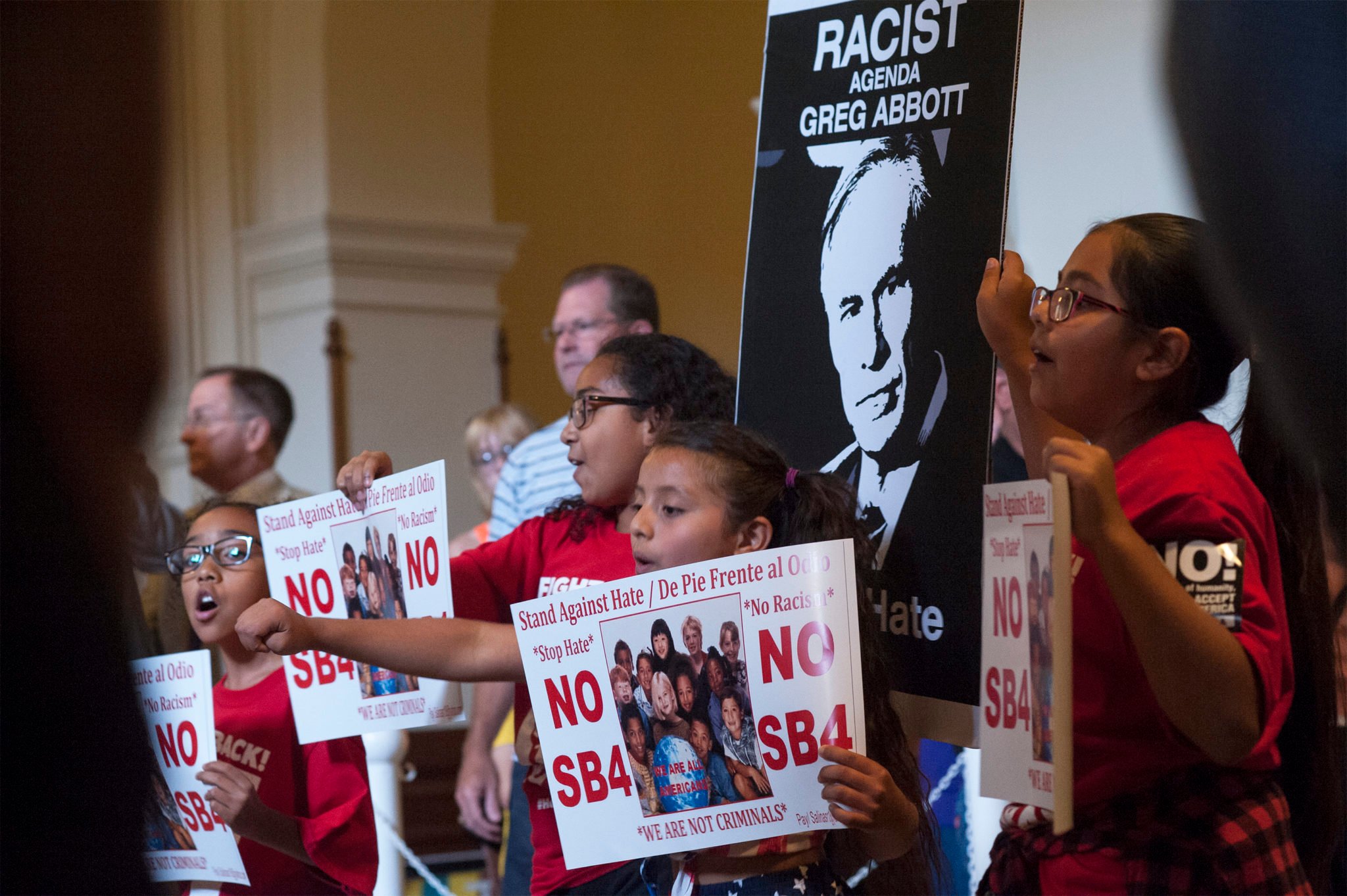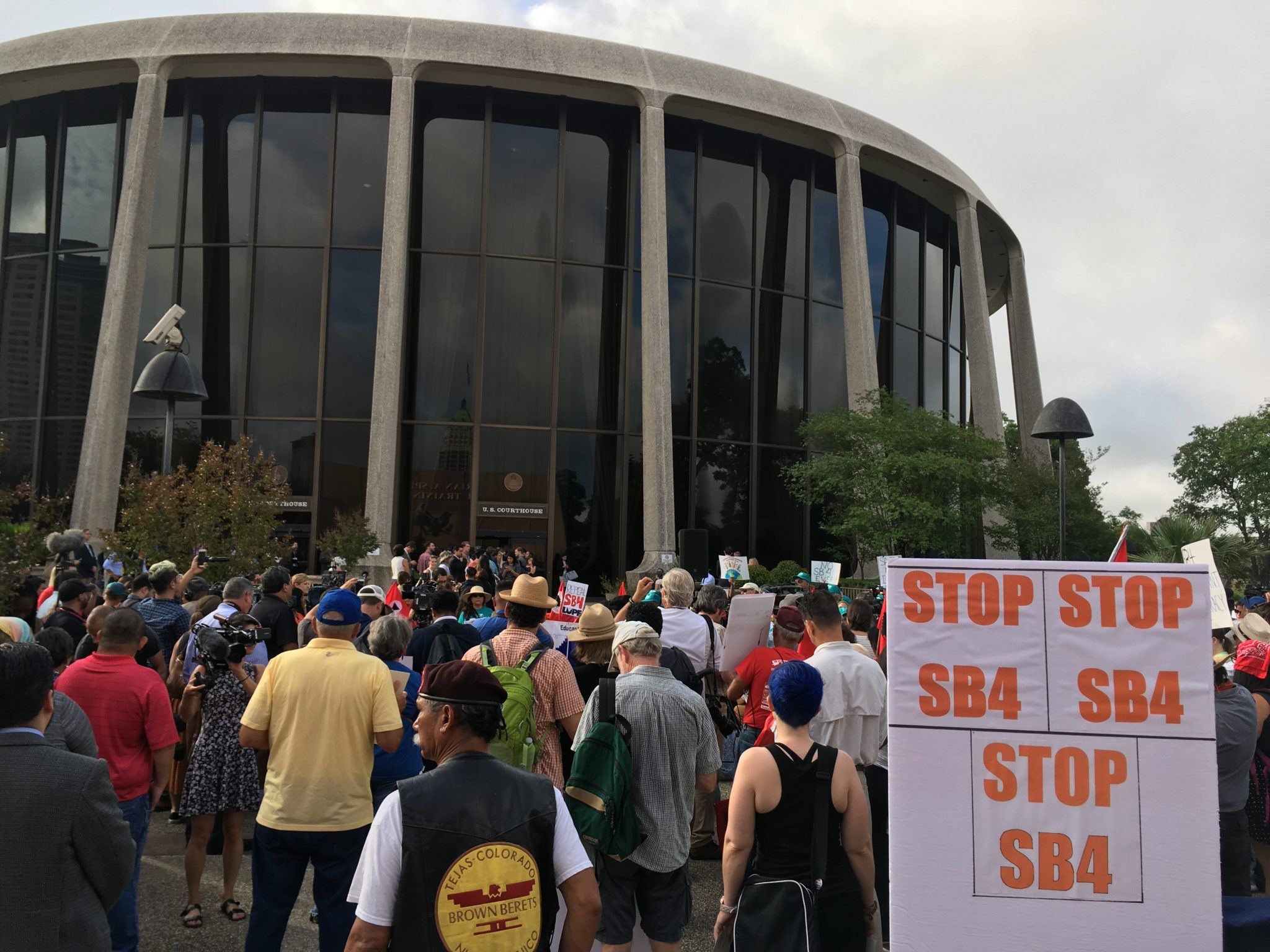
Court Revives Possibility that Texas Sheriffs Could be Jailed for Refusing ICE Detainers
Travis County Sheriff Sally Hernandez is reportedly changing the jail’s policy to honor all immigration detainers after the ruling.


It’s official: Texas sheriffs could risk jail time for rejecting some immigration detainers. On Monday, a Fifth Circuit Court of Appeals ruling unleashed parts of the state’s “sanctuary cities ban” that a lower court had temporarily blocked last month. The appeals court revived a section of the controversial Senate Bill 4 that requires Texas jails to honor voluntary Immigration and Customs Enforcement (ICE) detainers — requests to extend detention of suspected undocumented immigrants so they can be deported.
Law enforcement officials could now face a Class A misdemeanor, which carries up to a year in jail and a $4,000 fine, for refusing to honor some detainers.
The Fifth Circuit’s six-page ruling clarified that jails do not have to honor detainers on individuals who can provide “proof of legal status,” or if complying with the request would violate “existing ICE practice” or law. A lower court ruled last month that making detainers mandatory could violate the Fourth Amendment.
Monday’s decision is not permanent — it allows parts of SB 4 to go into effect until the Fifth Circuit has a chance to weigh the constitutionality of the law itself. The ruling appears to leave some room for interpretation, as parties on both sides of the issue claimed victory.
“We are pleased today’s 5th Circuit ruling will allow Texas to strengthen public safety by implementing the key components of Senate Bill 4,” Texas Attorney General Ken Paxton said in a statement. “The 5th Circuit found that Senate Bill 4’s requirement that local governments comply with federal immigration detainer requests should take effect.”
But MALDEF (the Mexican American Legal Defense and Educational Fund), issued a statement saying the court “limited” the detainer provision, allowing local jurisdictions “to decline requests they believe could violate constitutional rights or other laws.”
The ruling prompted reactions from officials in Travis County, home to the only jail in the state that systematically declines to extend detention of suspected undocumented immigrants charged with minor crimes.
“The 5th Circuit has left law enforcement throughout the state in confusion about what it means to ‘comply, honor and fulfill’ immigration detainer requests,” Travis County Judge Sarah Eckhardt said in a statement.
Shortly after, Travis County Sheriff Sally Hernandez issued a statement saying she had “updated” her jail policy to comply with the new ruling. The Austin American-Statesman reported the sheriff will now honor all detainer requests.

SB 4 emerged from a dispute between Governor Greg Abbott and Hernandez. In February, Hernandez announced she would no longer hold people for ICE unless they were charged with certain serious crimes such as murder or sexual assault. Abbott responded by threatening to remove Hernandez from office, revoking unrelated grant funding and tweeting that he would “hammer” the Central Texas county that includes around 1.2 million of his constituents. The governor vigorously supported the “sanctuary cities” ban during the legislative session and signed it into law in May.
The appeals court’s decision also undid a second portion of the lower court’s injunction. Garcia had allowed — contrary to SB 4 — police chiefs and sheriffs to forbid untrained officers from routinely “providing enforcement assistance” to immigration agents. As of Monday, law enforcement leaders may discourage but not explicitly prohibit their officers from doing so.
The rest of Garcia’s injunction survived, including his decision to strike the phrases “materially limit” and “endorse” from the law. That means local officials still cannot be punished for merely speaking out against cooperation with immigration agents, and that police chiefs and sheriffs are free to make immigration enforcement a low priority.
“The Fifth Circuit’s ruling today allows for dangerous portions of SB 4 to go into effect,” said Austin City Council member Greg Casar, who in May was arrested protesting the law, in a statement. “[But] we can pass immigrant protection policies that direct our law enforcement agencies to protect our residents’ constitutional rights — the rights that we still all have — even under SB 4.”
Editor’s note: This story initially reported that a Class A misdemeanor carries a punishment of up to six months in jail. In fact, punishment ranges up to a year.

